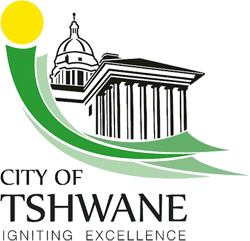
Pretoria is South Africa's administrative capital, serving as the seat of the executive branch of government, and as the host to all foreign embassies to South Africa.

The City of Tshwane Metropolitan Municipality, also known as the City of Tshwane, is the metropolitan municipality that forms the local government of northern Gauteng in South Africa. The metropolitan area is centred on the city of Pretoria with surrounding towns and localities included in the local government area.

Mamelodi is a township northeast of Pretoria, Gauteng, South Africa. A part of the City of Tshwane Metropolitan Municipality, it was set up by the then apartheid government in 1953.

Soshanguve is a township situated about 30 km north of Pretoria, Gauteng, South Africa, just east of Mabopane. The name Soshanguve is an acronym for Sotho, Shangaan, Nguni and Venda, thus showing the multi-ethnic composition of the population. The major African languages of South Africa are heard in Soshanguve.
Ga-Rankuwa is a large settlement located about 37 km north-west of Pretoria. Provincially it is in Gauteng province, but it used to fall in Bophuthatswana during the apartheid years, and under the North West province until the early 2000s.

AmaNdebele are an ethnic group native to South Africa who speak isiNdebele. The group is separate from the Northern Ndebele who broke away from the Zulu during Tshaka's time. They mainly inhabit the provinces of Mpumalanga, Gauteng and Limpopo, all of which are in the northeast of the country. In academia this ethnic group is referred to as the Southern Ndebele to differentiate it from their relatives the Northern Ndebele people of Limpopo and Northwest.

Bon Accord Dam is an earth-fill type dam located on the Apies River, some 15 km north of Pretoria. The dam comprises an earth embankment with a side spillway. The catchment area of the dam is 315 km2 and comprises primarily the City of Tshwane Metropolitan Municipal area in Gauteng, South Africa. It was established in 1923 and its main purpose is irrigation.

The Crocodile River is a river in South Africa. At its confluence with the Marico River, the Limpopo River is formed.

The Pienaars River is a river in South Africa. It is a tributary of the Crocodile River. A short section of this river is known as the Moretele River. Tributaries of the Pienaars River include the Moreletaspruit. Note that the above-mentioned Moretele river section is 60 km away from the Moreletaspruit and these two should not be confused with one another.
The R101 is a Regional Route in South Africa that is the designation for some of the old sections of roads that were previously the N1, prior to upgrading. It only has 2 sections, from Bellville to Worcester and from Johannesburg to Polokwane.

Pretoria North is a suburb of the city of Pretoria, Gauteng, South Africa, with a population of 16,972 people according to the 2011 census.
Pretoria Taal, or Pretoria Sotho, is the urban lingua franca of Pretoria and the Tshwane metropolitan area in South Africa. It is a combination of Sepedi-Tswana and influences from Tsotsitaal, Afrikaans and other Bantu languages of the region. It is spoken by most black residents of all ages and levels of education in Tshwane. Though it is most commonly used in informal situations, it is also used in schools and at political events in which people have different language backgrounds. Standard Setswana and Northern Sotho are not commonly used in schools except in SeTswana and Northern Sotho lessons. Pretoria Taal is mutually intelligible with SeTswana and Northern Sotho.
The R513 is a Regional Route in South Africa that connects Hartbeespoort with Bronkhorstspruit via Akasia, Pretoria North and Cullinan.
The R566 is a Regional Route in South Africa that connects Brits with Pretoria North via Ga-Rankuwa and Rosslyn.
The following is a timeline of the history of Pretoria, in the City of Tshwane Metropolitan Municipality, Gauteng province, South Africa.
The M8 road is a metropolitan route in the City of Tshwane in Gauteng, South Africa. It connects Capital Park with Mamelodi via Gezina, Villieria and Eersterust.
The M1 road is a short metropolitan route in the City of Tshwane in Gauteng, South Africa. It connects Pretoria West and the Pretoria CBD with Pretoria North via Mayville.
The M3 road is a short metropolitan route in the City of Tshwane in Gauteng, South Africa. It consists of only one road in the Pretoria CBD.
The M35 road is a metropolitan route in the City of Tshwane in Gauteng, South Africa. It connects Pretoria North with a rural area north of Soshanguve.










